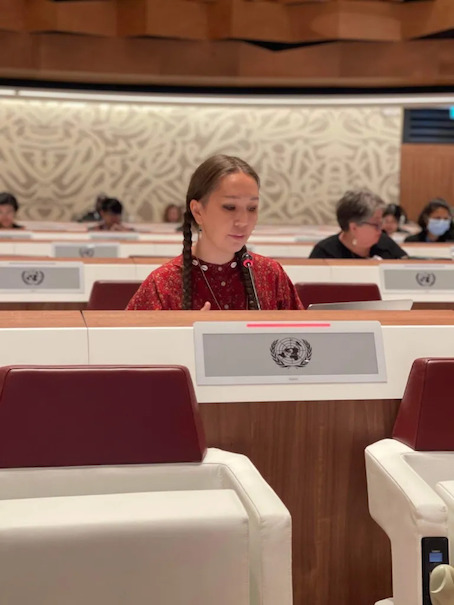Yana Tannagasheva’s statement at EMRIP 15th session. Agenda #3 “Study on Treaties, agreements and other constructive arrangements, between indigenous peoples and States”

ITEM 3: Study on Treaties, agreements and other constructive arrangements, between indigenous peoples and States, including peace accords and reconciliation initiatives, and their constitutional recognition
EMRIP 4-8 July 2022
Oral statement of Ms. Yana Tannagasheva on behalf of Society for Threatened Peoples / International Committee of Indigenous Peoples of Russia (ICIPR)
Thank you Mr/Madam Chair.
As a representative of the Shor People from southwestern Siberia, who has been directly affected by the Russian regime and coal mining companies, I want to draw your attention to the violations of the rights of indigenous peoples by the Russian authorities and mining companies.
Unfortunately, no treaties regarding indigenous peoples are in force in the Russian Federation. A vivid example of this is the Kazas village in Kemerovo region, where I am from. The village was burned down by the coal company 8 years ago. The case of this village and violations of the Shor people rights was considered by the Committee on the Elimination of Racial Discrimination. The concluding observations of the Committee were addressed to Russia: to restore the rights of the Shor people. However, the rights of the Shors continue to be violated by coal and gold mining companies, and the Russian authorities have both lied in their reports and continue to provide false information. Moreover, the Russian regime is increasing pressure and repression on those representatives of indigenous peoples who openly fight for their lands, territories, the right to self-determination and, in general, openly express their position.
I express concern that the Russian authorities and mining companies are manipulating representatives of indigenous peoples, using their vulnerable position to promote the state policies and propaganda both on national and international level. This applies, for example, to the Norilsk Nickel company, whose accident occurred in 2020, which became the largest oil spill in the Russian Arctic. This caused irreparable harm to the living environment of the indigenous peoples of Taimyr, negatively affects their nutrition, health, and psychological state, especially women and children. Today, the Russian authorities and Norilsk Nickel are trying to set a positive image of interaction with indigenous peoples at the international level by promoting the implementation of the FPIC principle. However, the indigenous peoples who live there tell us otherwise.
In general, the poor situation of the Indigenous Peoples of Russia was difficult even before the war, but now it has only worsened. Today in Russia it is almost impossible and dangerous to speak openly, to express your position freely. Indigenous peoples are criminalized in various contexts. Threats and harassment are more often directed against persons involved in the protection of environmental rights, land rights, and recently against those who openly protest against the war with Ukraine.
In conclusion, Mr/Madam Chair, I would like to recommend:
- Request the UN Special Rapporteur on the rights of indigenous peoples to pay special attention in future reports to the situation of the indigenous peoples of Russia, controversial situations, the implementation of the recommendations of treaty bodies, and also to investigate issues related to the criminalization of representatives of indigenous peoples who protect their lands, territories, resources.
- Recommend to the Human Rights Council that the mandate of a Special Rapporteur on the situation of indigenous peoples in situations of interstate conflict be established. And also include the UN Declaration on the Rights of Indigenous Peoples in the list of standards of the universal periodic review.
Thank you for your attention!